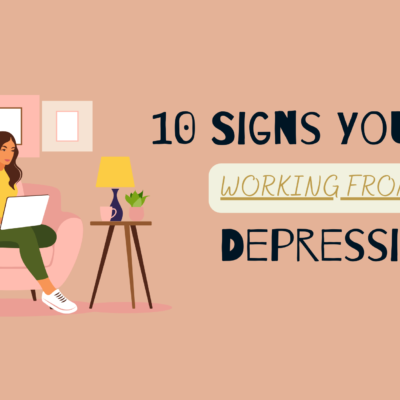Signs You Have Working From Home Depression: In recent years, the concept of working from home has gained a remarkable boost, driven by advancements in technology and the progressive preferences of both employers and employees. The COVID-19 pandemic further increased this trend, leading to a massive global shift towards work-from-home arrangements almost overnight.
While working from home presents multiple benefits such as flexibility and convenience, it also comes with its own set of challenges, including the risk of experiencing depression or other mental health issues. Working from home depression is a real phenomenon that can greatly impact people’s well-being and productivity.
So, in this article, we will talk about some signs that might indicate you are struggling with working-from-home depression.
Also Read:
- How To Be Positive Everyday?
- Signs of an Emotionally Draining Person.
- My Job Is Too Stressful to Handle. What Can I Do?
- How to Stop Missing Someone?
Signs You Have Working From Home Depression:
Constant Feelings of Sadness
One of the basic signs of depression is a continuous feeling of sadness or hopelessness that lasts over time. If you find yourself always feeling down or unable to reduce the feelings of sadness, it could be a red flag revealing that you are experiencing depression, heightened by the isolation of working from home.
Loss of Interest in Previously Enjoyable Things
Depression usually steals the pleasure that we once found in activities we used to enjoy. If hobbies or interests that previously brought you joy now feel like burdens, it may be a sign that your mental health is suffering.
Finding it Difficult to Concentrate or Make Decision
Depression can damage cognitive functions such as concentration, memory, and decision-making. If you are finding it challenging to concentrate on tasks or make simple decisions, despite earlier being able to do so, it could be a symptom of depression worsened by the blurred boundaries between work and home life in a work-from-home setup.
Changes in Sleep Patterns
Insomnia or oversleeping are common symptoms of depression. Working from home can disturb your specified routines, leading to irregular sleep patterns. If you are struggling to fall asleep, waking up continually during the night, or finding it challenging to get out of bed in the morning, it may reveal that your mental health is being impacted.
Feeling Lonely
Working from home minimizes the daily interactions and social connections that naturally occur in a traditional office environment. While technology permits virtual communication, it may not fully replace the sense of connection and belonging that comes from face-to-face interactions. If you are feeling lonely despite being continuously connected online, it could contribute to feelings of depression.
Feeling Irritated
Depression can manifest as irritability, or restlessness, even in people who don’t typically show these qualities. If you are getting easily annoyed, bursting at loved ones, or feeling restless without being able to determine a cause, it may be a sign that your mental health is declining.
Changes in Food Habits or Weight
Depression can affect your eating habits which gradually leads to significant changes in weight. Some people may experience a loss of appetite and unintentional weight loss, while others may turn to food for convenience, leading to weight gain. Observing changes in your eating patterns can provide useful insights into your mental and emotional well-being.
Physical Symptoms
Depression does not just affect mental health; it can also come in physical symptoms such as headaches, muscle aches, digestive issues, and tiredness. Working from home can worsen these symptoms, particularly if you are spending long hours in front of a screen without sufficient breaks or physical activity.
Guilt or Worthlessness Feeling
Depression usually misinterprets perceptions of self-worth and leads to feelings of guilt, irrespective of actual achievements. If you find yourself regularly criticizing or blaming yourself for perceived failures or shortcomings, it may be a sign that you are undergoing depression.
Finding it Difficult to Set Boundaries
Working from home blurs the lines between professional and personal life, making it challenging to set clear boundaries. This lack of detachment can lead to feelings of being continuously on call or unable to disconnect from work, contributing to burnout. If you find it difficult to set boundaries around your work hours or feel guilty when taking breaks, it may be a sign that your mental health is suffering.
At The End
Identifying the signs of working-from-home depression is the first step towards seeking support and executing strategies to enhance your mental well-being. If you identify with any of the symptoms mentioned above, consider reaching out to a mental health professional for guidance and support.
Adding to this, you should start prioritizing self-care, maintaining a routine, staying connected with loved ones, and seeking opportunities for social interaction can help minimize the negative effects of working from home on mental health.
Remember that you are not alone in this, and there are many resources available to help you handle these challenges and appear stronger on the other side.








